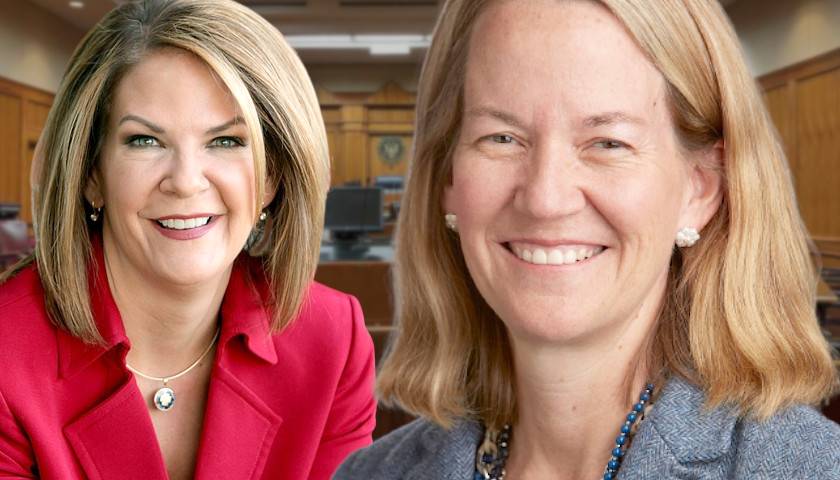Politically motivated prosecutors have begun charging the slates of alternate electors from the 2020 presidential election with crimes and are now investigating Arizona’s alternate electors. Democratic Attorney General Kris Mayes campaigned on a platform promising to investigate the alternate 22 Republican electors. No one has been ever charged with a crime for participating in an alternate electoral slate until now, even though alternate electoral slates have been presented throughout history.
Mayes said during an interview in February, “There has to be a deterrent to this happening again. We can’t have this occurring again in Arizona — or in the country.”
One of the Arizona alternative slates included former Republican Party Chair Kelli Ward and other high-profile Republicans, and the other slate consisted of Republican activists.
According to The Washington Post, investigators from Mayes’ office started contacting the electors and their lawyers recently. According to Dan Barr, Mayes’s chief deputy, the investigation is in the “fact-gathering” phase.
On the federal side, Special Counsel Jack Smith has interviewed and subpoenaed about a dozen Arizonans in relation to the slates. The federal investigation began in early 2022.
Michigan’s attorney general Dana Nessel announced felony charges last week against 16 Republicans for participating in a 2020 alternate electoral slate. Each person has been charged with one count of conspiracy to commit forgery, two counts of forgery, one count of conspiracy to commit uttering and publishing, one count of uttering and publishing conspiracy to commit election law forgery, and two counts of election law forgery.
Conspiracy to commit forgery and conspiracy to commit uttering and publishing have the steepest penalties, punishable by up to 14 years in prison and a $10,000 fine.
The Michigan alternate electors include Meshawn Maddock, a former co-chair of the Michigan Republican Party, and Kathy Berden, a national committeewoman for the Republican National Committee.
In Georgia, Atlanta-area District Attorney Fani Willis has been conducting a criminal investigation into Trump’s actions in Georgia regarding the alternate electors. Eight of 16 Republicans under investigation for participating in the alternate electoral slate have been granted immunity by prosecutors. The defendants filed pleadings asserting that since “federal law specifically anticipates and permits the submission of more than one slate of presidential electors from a State … an action specifically permitted by federal law cannot be a crime.”
In Wisconsin, a civil suit filed by Democrats is going forward against the alternative slate of electors there. Defendants include Andrew Hitt, the former chairman of the Republican Party of Wisconsin. The DOJ is investigating other electoral slates from New Mexico, Nevada, and Pennsylvania.
In 1960, the race between Democrat John F. Kennedy and Republican Richard Nixon in Hawaii was so close, with Nixon coming out ahead, that a recount was ordered. As the recount took place, both political parties sent slates to Congress with signed certificates. After Kennedy was declared the winner following the recount, a new slate of electors was sent to Congress, which Nixon honored as the vice president.
In 1876, the presidential race was extremely close between Republican Rutherford Hayes and Democrat Samuel Tilden. The situation was especially tense in southern states, due to Democrats threatening violence in order to keep blacks from voting. In Florida, Republican electors in Florida voted for Hayes, backed by certification from the state’s canvassing board that Hayes had won the state. Some people believed that Hayes really hadn’t won. At the same time, Democratic electors voted for Tilden, backed by the state’s attorney general, a Democrat, who certified the results. But after the state legislature and courts got involved, that certification was overturned.
In South Carolina, Democrats claimed that Tilden won, arguing that the state lacked a voter registration law, even though the state’s constitution required one. They submitted their slate supporting him to Congress. They admitted that their submission was not “signed by the governor” and “the seal of the State as affixed thereto, as required by law, is not attached.” There were also dueling slates from Louisiana, which involved forgery, but no one was prosecuted.
Democrats also submitted an alternative slate from Vermont supporting Tilden. According to Just Security, “there was never any pretense that … [the] purported package of electoral votes from Vermont had any official recognition from the state’s government.” So the envelope was not even opened by the vice president.
Congress created a 15-member Electoral Commission to decide the 1876 electoral dispute, which found in favor of Hayes. The Commission agreed unanimously that the individuals in South Carolina who purported to cast electoral votes for Tilden “were not the lawful electors for the State of South Carolina, and that their votes are not the votes provided for by the Constitution of the United States, and should not be counted.” They voted more narrowly, 8-7, to award the other disputed slates to Hayes, giving him the presidency.
The Twelfth Amendment to the U.S. Constitution governs the Electoral College and how electors are chosen. It leaves how they are selected up to the states. “The Electors shall meet in their respective states and vote by ballot for President and Vice-President,” it provides in part, and “in choosing the President, the votes shall be taken by states.”
A.R.S. 16-212 provides the process for selecting electoral slates in Arizona. It says very little about the specifics; the main portion in (B) states, “After the secretary of state issues the statewide canvass containing the results of a presidential election, the presidential electors of this state shall cast their electoral college votes for the candidate for president and the candidate for vice president who jointly received the highest number of votes in this state as prescribed in the canvass.”
The alternate electors in Arizona include:
- Kelli Ward
- Michael Ward
- Nancy Cottle
- Loraine B. Pellegrino
- Tyler Bowyer
- Jake Hoffman
- Anthony T. Kern
- James Lamon
- Robert Montgomery
- Samuel I. Moorhead
- Greg Safsten
– – –
Rachel Alexander is a reporter at The Arizona Sun Times and The Star News Network. Follow Rachel on Twitter. Email tips to [email protected].
Photo “Kris Mayes” by Kris Mayes. Photo “Kelli Ward” by Gage Skidmore. CC BY-SA 3.0.





